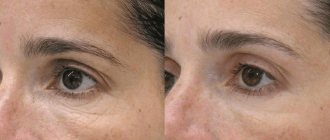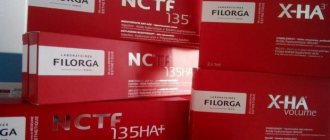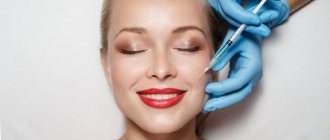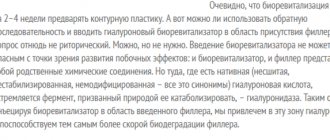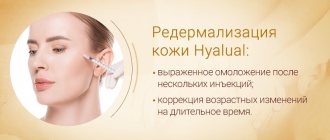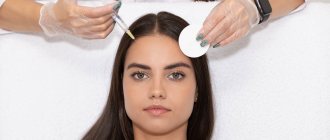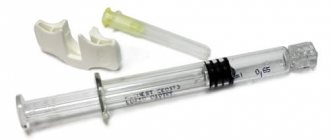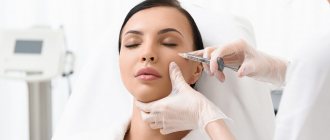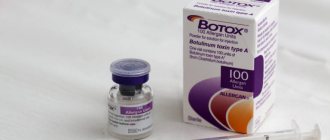Age characteristics
Mesotherapy is a more flexible procedure, so even those who have recently turned 20-25 years old should undergo it. It will provide young skin with nutrition, vitamins and other beneficial substances. Thanks to this, your face will remain beautiful longer and the aging process will slow down. At a later age, mesotherapy is useful as one of the types of antiage care.
Biorevitalization with hyaluronic acid is indicated for patients over 30 years of age, because Usually, it is at this age that the amount of water in the cells decreases significantly, and the synthesis of collagen and elastin gradually slows down.
Hyaluronic acid or mesotherapy – which is better?
A variety of anti-aging injection techniques and drugs often make patients think - what exactly to choose for optimal results? Mesotherapy raises the most questions; these are “cocktails” of several useful ingredients and biorevitalization - hyaluronic acid. These popular procedures are similar in many ways, but they differ in the composition of the drugs, the principle of action, the duration of the effect, and the range of problems solved.
What exactly are the differences, which option is better and more effective? It is advisable to find out about this even before going to a cosmetologist for a dose of youth and beauty, in order to avoid disappointments and achieve exactly the result you dreamed of. We will help you prepare and make the right choice.
What is the fundamental difference between mesotherapy and biorevitalization? At first glance, these procedures are not much different from each other - in both cases, the drug is injected into the middle layers of the skin, most often by injection. Patients who have tried both methods say that the preparation for the manipulations and their implementation are almost the same, including in terms of the intensity of pain.
The doctor thoroughly cleanses the skin and treats it with an antiseptic to prevent infection. An anesthetic is applied to the face, the specialist injects the desired drug into the designated points until small papules (bumps) form on the skin. The puncture depth is 1-3 mm, depending on the problem being solved. Upon completion, an anti-inflammatory and soothing cream is applied to the treated area. Due to the similar scheme of implementation, some cosmetologists even call biorevitalization a subtype of mesotherapy. However, for the patient there are differences, and very significant ones. First of all, these are the goals of each procedure.
Biorevitalization is carried out to moisturize the skin and generally improve its appearance. After it, the face looks refreshed and rested, small wrinkles may smooth out a little. But deeper folds, as well as acne, spots of any origin, spider veins and other unaesthetic details, unfortunately, will not go away. Mesotherapy is intended to correct internal problems of our skin: disturbances in the functioning of the sebaceous glands, pigmentation problems, weak vascular walls, dark circles under the eyes and much more: the necessary drug and injection protocol can be selected for almost any such defect. Thus, this procedure is largely therapeutic, therapeutic. As for aesthetics, unhealthy skin has characteristic external manifestations (inflammation, redness, uneven relief, etc.), which upon completion of the course disappear completely or, at least, become much less pronounced. However, the visible effect in terms of general external facial rejuvenation is minimal - it may not exist at all if the cosmetologist did not initially have such a task.
The next most important difference is that for each of the procedures, drugs are used that are fundamentally different in composition. For mesotherapy, these are special mixtures - so-called “cocktails” of several (and sometimes several dozen) useful ingredients: vitamins, minerals, hyaluronic acid, peptides, plant extracts, amino acids necessary for the skin and others. Cosmetologists can use ready-made cocktails from manufacturers, or mix them themselves - however, in the latter case, the doctor must be a real pro in order to avoid mistakes in the choice of ingredients and their proportions. The main and only component of biorevitalization preparations is hyaluronic acid (HA). The entire effect of the procedure is based precisely on the action of hyaluronic acid, which deeply moisturizes and nourishes the skin, promotes the regeneration (renewal) of its cells, the production of new collagen and elastin. As a result, the number of procedures required to obtain the desired effect, its duration, as well as the interval between sessions within the course differ.
Comparison criterion | Mesotherapy | Biorevitalization |
Composition of drugs | A large number of active ingredients - vitamins, homeopathy, minerals, medicines. They provide the main therapeutic result. HA is often used, but not always. | The basis will always be hyaluronic acid. In classical preparations it is the only ingredient. But recently, manufacturers are increasingly enriching their products with vitamins, amino acids, peptides, etc. |
How it works | Absolutely different, depending on the composition of the cocktail | Hyaluronic acid saturates the skin with moisture and fills wrinkles |
Application areas | Almost everywhere: the whole face, body, and even the scalp | Face, hands, décolleté |
Type and concentration of HA | Unstabilized, 0.5-1% | Unstabilized. As a rule, at least 1.5% |
Duration of results after the course | 6-8 months | up to 6 months |
Number of procedures in the course | 4-8 | 3-5 |
Interval between sessions | 1 Week | 3 weeks |
When does the effect appear? | After the full course | Often after the 1st session |
Which procedure is better and more effective?
This is the question that patients usually ask their cosmetologists at the first consultation. As we have already figured out, in each case different drugs are used, respectively, their effect and the general advisability of use will vary depending on what kind of skin problems the patient has.
Problem | Mesotherapy | Biorevitalization |
Acne, enlarged pores, post-acne | Gives an excellent effect with the right cocktail composition | It may improve the situation slightly due to the general beneficial effect of hyaluronic acid, but it will not change anything radically |
Uneven skin tone | Both procedures can produce clear positive changes | |
Cuperosis and other vascular defects | Provides results from moderate to very good thanks to ingredients aimed at strengthening the walls of blood vessels | Not applicable |
Dry, dehydrated skin; preparation for tanning and rehabilitation after a holiday in the sun | It is used, but gives a less pronounced effect than biorevitalization | It has an excellent effect due to the moisturizing properties of hyaluronic acid. Considered ideal for preventing UV damage to the skin |
Fat folds in the chin, cheekbones, cheeks | Allows you to eliminate small excesses with the help of superficial injection of special drugs - lipolytics. Larger deposits require deep injections using a different technique (intralipotherapy) | Not applicable |
Photoaging | The result will be mainly in patients under 30 years of age. Achieved through cocktails with antioxidants. | Effective at any age: it triggers protective and regenerative mechanisms to counteract UV radiation, maintains water balance. |
Medium and deep wrinkles, eyelid ptosis, jowls, general skin sagging | Neither procedure is suitable. Mesotherapy can slightly improve skin tone due to a complex of vitamins and minerals, nucleic acids and amino acids, and biorevitalization due to the action of hyaluronic acid, but these will be extremely minor changes. In this case, fillers, hardware lifting and/or plastic surgery will give a much better result. | |
The need for skin restoration after traumatic hardware procedures or operations | Has a positive result, but biorevitalization is better | Gives an excellent effect due to stimulation of collagen production, deep hydration and strengthening of tissues |
Age nuances.
Another difference between the procedures is the age of the patients. There are no strict frameworks here, but, as a rule, cosmetologists adhere to this position. Girls under 30 are better off opting for mesotherapy. They still produce hyaluronic acid in the required quantities naturally, and there is no need for additional stimulation of this process. But there are problems that can significantly spoil young and blooming skin - acne, unevenness, darkening under the eyes, redness, etc. And mesotherapy with its variety of life-saving cocktails can eliminate any such imperfection. Older women, as a rule, are not bothered by pimples on their faces; they have a more serious task - to stop the visible signs of aging. And to do this, you need to regularly replenish the reserves of hyaluronic acid, which our body produces less and less with age. Biorevitalization will nourish the facial skin with life-giving moisture and activate the process of production of collagen and elastin, which will give it elasticity and temporarily stop the withering process. Thus, meso-cocktails are perfect for girls aged 25-30 to nourish the skin with vitamins, give it radiance, even out the color, and get rid of acne. And biorevitalization is ideal for women after 30 and even after 40 years - as a remedy for drying out and thinning of the skin, as well as general prevention of aging. At an even older age (50+), the procedure will only be effective in combination with other anti-aging techniques and/or plastic surgery.
Purpose
Biorevitalization is primarily aimed at correcting age-related problems, it makes wrinkles less pronounced, has a positive effect on dry skin, and stops the photoaging process. The procedure is also recommended for dehydration.
Mesotherapy, the prices of which are affordable, can be used not only to solve rejuvenation issues, but also for a wider range of problems: nutrition, general skin health, treatment of cellulite and weight loss, hair strengthening and growth, it can also be prescribed for acne, rosacea and other problems. In relation to the aging process, its effect is preventive.
Biorevitalization
Still, on average, after 35 years, it is worth resorting to a procedure such as biorevitalization. This is also an injection method, the depth of injection varies from 4 to 6 mm - that is, this is a deeper layer of the dermis.
Biorevitalizants mainly consist of pure hyaluronic acid and perform one single task - moisturizing the skin.
Biorevitalizants, in turn, may also contain substances such as peptides, which enhance metabolic processes in the skin and stimulate neocollagenesis - that is, the formation of new collagen-elastin fibers, which provides us with an additional lifting effect. Therefore, after the age of 40, it is better to carry out such peptide biorevitalization.
The biorevitalization procedure is also performed in a course. Most often, it is carried out once every 2 weeks in a course of 4-6 procedures - regardless of whether it is peptide biorevitalization or conventional, which performs only a single function - moisturizing the skin.
And yet, what to choose – mesotherapy or biorevitalization?
In general, mesotherapy and biorevitalization are procedures that are worth performing, since they prevent age-related skin changes and the occurrence of certain skin problems.
Mesotherapy is more aimed at the upper layer of the skin - its tone, blood microcirculation, treatment. While biorevitalization works on the deeper layer of the dermis, it moisturizes and restores it.
The choice of one procedure or another is made based on the patient’s identified goals, individual skin qualities, and age.
Author of the article:Grishko Olga Nikolaevna Dermatologist, cosmetologist, laser therapist, specialist in injection techniques. Read more… |
How is biorevitalization carried out?
Biorevitalization is performed only in a cosmetology clinic; you cannot perform the procedure by injection yourself at home.
The work is carried out in several stages:
- The affected area is numbed with a patch soaked in an anesthetic, or treated with a freezing gel.
- Then the surface of the skin in the puncture area is treated with antiseptic agents to prevent germs from entering the blood and prevent infectious complications.
- Injections with a restorative drug are performed in the affected area. Punctures are made using a thin needle that leaves no visible marks.
- Upon completion of the biorevitalization procedure, repeated antimicrobial treatment of the skin is carried out.
- Then a soothing cream is applied to the skin. It helps reduce swelling and redness of the skin that occurs at the injection site.
Skin care after the biorevitalization procedure
After the procedure, it is not recommended to be in the sun for several days; you should not wet the injection sites with water. You also cannot visit baths, saunas and solariums, or use cosmetics for the first three days.
The procedure does not affect the facial muscles in any way, so you can smile and laugh.
In addition, to achieve a good effect, you need to get enough sleep, stop smoking and drinking alcohol. If these conditions are violated, the visible effect of therapy can be reduced by 20–40%.
Benefits of biorevitalization
Thanks to biorevitalization, facial skin tissues are rejuvenated, collagen is actively produced in them, fine wrinkles disappear, and the skin becomes even and smooth.
The drugs begin to act almost immediately after injection into the tissue. After some time, the following positive changes occur in the skin:
- Hydration. Hyaluronic acid retains fluid, so the skin is evened out, does not crack, does not flake
- Tightness and elasticity. The skin tone increases, it becomes fresh and elastic.
- Rejuvenation. Thanks to the antioxidant properties of the drugs, the aging process slows down, the skin structure is restored and rejuvenated.
- Skin color improves. The face acquires a healthy physiological color.
- Texture alignment. Injections of hyaluronic acid help smooth out minor skin defects and fill it with vitality.
The rate of resorption of papules depends on the following factors:
- Concentrations of hyaluronic acid in the preparation. The higher the hyaluronic acid content, the longer the papules last.
- Patient's skin hydration. Let me remind you that the first stage in the skin is the decomposition of hyaluronic acid into smaller saccharides, from which our own will subsequently be synthesized. This process occurs under the action of the enzyme hyaluronidase, is called hydrolysis and requires the presence of water. The better the skin is moisturized, the faster hydrolysis occurs, the faster the papules disperse. Thus, the duration of resorption of papules is an indirect diagnostic sign of the level of moisture in various areas of the skin. That is why on young skin with good turgor, papules last much less than on thin, dry skin.
- Individual hyaluronidase activity.
- External influences that increase blood flow to the face, such as a sauna, steam bath, local warming agents, and physiotherapy, accelerate the resorption of papules.
Biorevitalization prices
| Service code | Area of influence / List of procedures / Drug | Price |
| А11.01.012 | JALUPRO | 7000 |
| A11.01.013 | VISCODERM 0.8% | 8500 |
| A11.01.013 | VISCODERM 2.0% | 9500 |
| А11.01.012 | AQUASHINE | 15000 |
| A11.01.013 | MESO-WHARTON P199 | 18500 |
*
— the price is indicated in rubles
Biorevitalization after 50 years
Another effective method of combating aging skin is biorevitalization. During the procedure, stabilized hyaluronic acid is injected under the skin. The substance is identical to the one that the body produces on its own, so it is perfect for correcting epidermal problems. After all, if there is not enough natural hyaluronic acid, the skin loses its tone, becomes flabby, and wrinkles appear. The substance helps retain water molecules and solves problems such as:
- loose skin;
- fine wrinkles on the face, neck and décolleté;
- dry epidermis that has lost elasticity and tone;
- age-related pigmentation;
- enlarged pores;
- unhealthy skin color;
- dark circles under the eyes;
- enlarged pores.
Distinctive features of the procedures for their use:
- By age - injections with vitamins can be administered even after 20 years, and hyaluronic acid is best used for visible age-related changes in the skin after 28-30 years.
- Time of exposure - none of the procedures gives an effect the next day; each of them is recommended to be done in a course. The introduction of hyaluronic acid during biorevitalization provides noticeable changes after 3-10 days, and with mesotherapy you can notice the first effect after 2-4 weeks (depending on the drug).
- Preservation of the effect - the result after biorevitalization lasts from 3 months to 2-3 years, and after mesotherapy - up to a year.
Which procedure is best for you? This issue can only be resolved by a cosmetologist after conducting a computer diagnostic of the skin, also taking into account your age and health status.
Botox and Xeomin
For people over 50, a procedure using botulinum toxin - botulinum therapy - will be effective. The Sanmedexpert clinic uses two popular drugs that contain this substance - Botox and Xeomin. Botulinum toxin reduces neuromuscular activity, allowing not only to eliminate, but also to prevent the appearance of facial wrinkles. The procedure is especially effective against “crow’s feet” around the eyes, wrinkles on the forehead, and the bridge of the nose. Benefits of botulinum therapy:
- rapid appearance of results;
- long-term effect after the procedure;
- safety and painlessness;
- short duration of the procedure.
The Sanmedexpert clinic employs professional cosmetologists who will help you choose the appropriate procedure individually, taking into account the characteristics of the body and skin condition. Advanced technologies used by doctors, as well as high-quality drugs, ensure high safety and effectiveness of anti-aging procedures, allowing you to look young after 50 years.
